A collapse of the RAF would be tantamount to disaster, considering drivers are held personally liable for negligent acts and road traffic collision victims are deprived of recovery of damages.
Therefore, elements of the current Road Accident Fund Act are in need of amendment. In the short term, government has to bail out the RAF so that the aims of its legislation are met.
According to Emeritus Professor Hennie Klopper from the University of Pretoria Department of Private Law Law who is also Third Party Compensation and RAF Practitioners Guide author,.
In fact, according to Klopper, the compensation system for the victims of road traffic crashes is in crisis.
He maintained that, although many are now clearly stating that the RAF is facing financial problems, a lot of focus is at present directed toward the current RAF management’s efforts to resolve those problems.
These range from the reclassification of the road traffic collision compensation system as a social benefit scheme, to advocating for the restriction of medical cost payments funded by medical aid, compensation for foreigners and high-income earners, and the removal of attorneys from the claims process.
This leaves one wondering whether the measures put in place will have the effect of turning around the fortunes of the RAF. According to Klopper, in order to answer this question, a review of the factors that have contributed to the current RAF crisis is necessary.
He stated that three elements determine the fortunes of the RAF: the level of risk to which the RAF is exposed, the funding level, and the efficiency of the RAF’s execution of its statutory obligations to investigate and finalise claims.
Risk exposure is rarely discussed, but it is at the heart of assessing the financial prospects of the RAF. Oddly, this was never a point of discussion in measures to improve the well-being of the RAF.”‘
Klopper said that the system has had many commissions of inquiry but none has ever taken into account the threat upstream – namely what risk gives to the RAF.

It would seem that the risk level that the system is facing has been seen as acceptable as well as inevitable. This has been buttressed by a recommendation from the Melamet Commission of Inquiry that increased the fuel levy to R3.30 per litre. The 2002 RAF commission proposed that a social benefit scheme be introduced subjected to affordability.
“If we consider the risk factor, it is very clear that it requires proper consideration,” Klopper said.
He clarified the point that the RAF is responsible for paying compensation for injuries and fatalities resulting from reckless traffic driving which caused the road traffic crashes. The more road traffic collisions are the more financial exposure for the RAF.
According to the Road Safety Annual Report 2017, South Africa is one of the countries with the highest per capita fatality rate and rates of fatalities per 10,000 vehicles over 40 countries. The annual road traffic collision fatality rate has remained at approximately 14,000 deaths per 10,000 vehicles,” Klopper said.
As estimated from independent analysis of unnatural deaths, the fatality rate is about 20 per 10,000 vehicles. Altogether around 370,000 people are injured yearly in incidents related to road traffic collisions, of whom about 73,000 are serious.

Klopper said road traffic accidents generate about 100,000 RAF claims each year (107,000 in 2023), which must be handled by the RAF’s staff, of which only 457 are professionally qualified. “These incidents cost the South African economy about R186 billion annually and affect the lives of about 2 million South Africans.”
However Klopper said, because of claims liability some insurance companies went liquid. The level of claims required a drastic increase in levels of insurance premiums before 1986. The government established a commission of inquiry, which presented recommendations.
Owing to required premium levels, the government decided to convert the compensation system from one funded by insurance premiums to one funded by an initial 6 cents fuel levy rather than increasing premiums.
“This change did not change the basis or level of compensation or claims procedures. The fuel levy has an advantage over insurance: there is no choice but to pay, thereby eliminating uninsured vehicles; and it’s fair since the payments are distance travelled and fuel consumed.”
However, it has economic and political constraints. Each increase in the levy impacts the economy, and similarly, there is bound to be a political reaction, say taxi operators and commuters protesting higher fares.
Klopper further continues that it also is an attenuating commodity with the trend towards fuel-efficient technologies and the end of the internal combustion engines, which are realities that policymakers have not figured into their considerations.
The RAF administration has a precarious and changing nature with its CEOs serving for five years only and the political head of the organisation changing frequently.
Due to the heavy burden of growing claims, the turnaround strategies of each incoming management team have been devised which have invariably proved most detrimental in nature.
Klopper pointed out that some of these measures have included Introducing more claims handlers and fewer claims assistants, which had an adverse impact on the productive manner and resulted in increased litigation.

